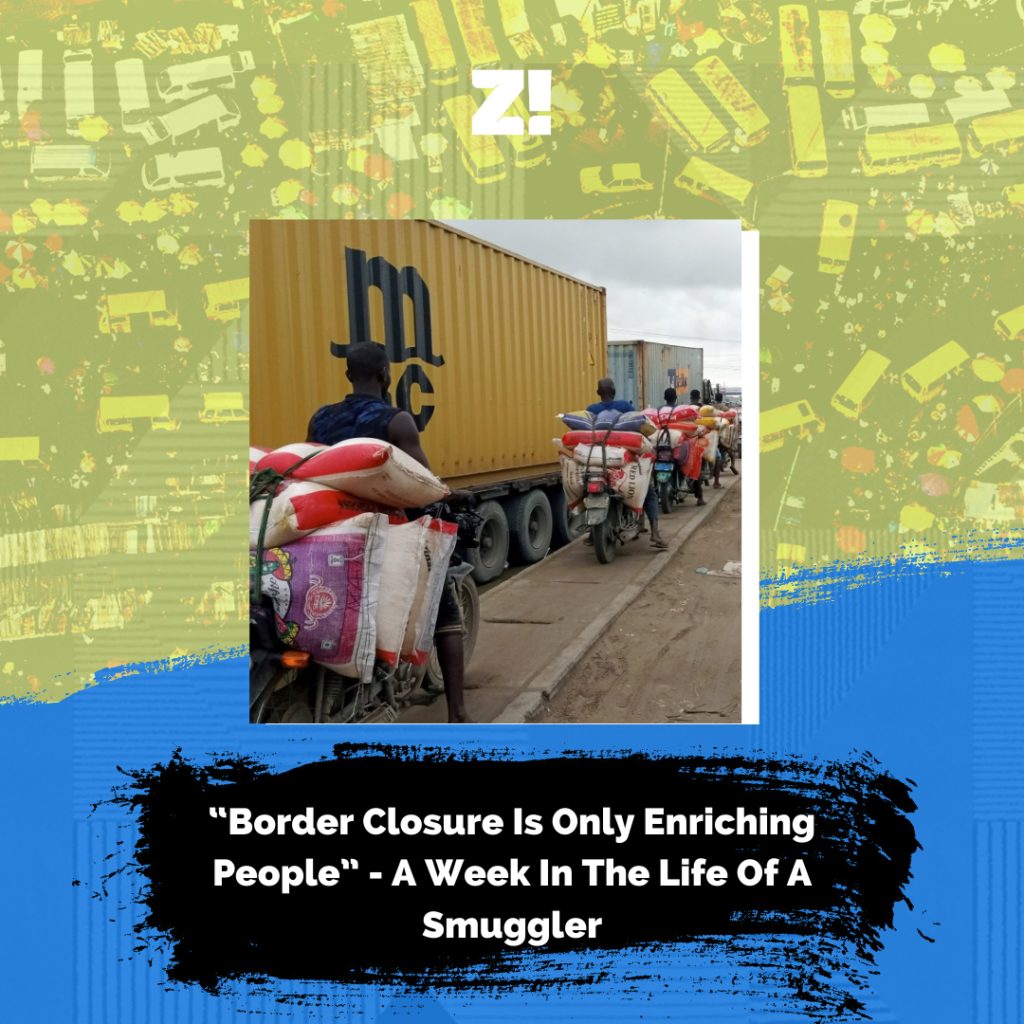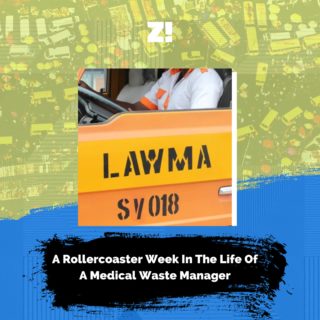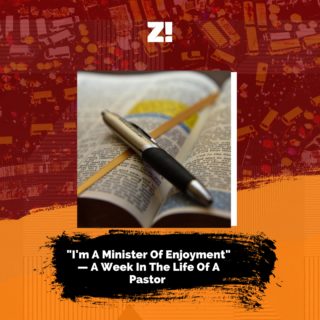“A Week In The Life” is a weekly Zikoko series that explores the working-class struggles of Nigerians. It captures the very spirit of what it means to hustle in Nigeria and puts you in the shoes of the subject for a week.
The subject for today is Mr M, a businessman and smuggler. He talks about the risk involved in his job, how bribes affect the prices of goods, and his hope to diversify his source of income.

MONDAY:
I wake up with my heart beating very fast. I calm myself down by taking deep breaths. In my dream, I bought large quantities of rice from smugglers who evaded border patrol. Immediately after paying them, customs officers came in and seized the rice. All my money, gone.
God forbid.
This smuggling business is risky — you risk your money, your property and your life. However, if it goes well, it can be highly profitable. Risk varies depending on the part of the smuggling chain you’re in. We have the drivers, who convey the goods from point A to B. These ones risk their lives because they drive at breakneck speeds to avoid being caught. We also have people called crossers. Their job is to ensure that goods successfully cross from point A to B. This involves making “arrangements” with the right officials along a particular route. They risk their time and money because, sometimes, after making all the plans, goods are still seized. Most times, this is due to an unforeseen circumstance like oga from Abuja is around or your money for that day has expired. Then, we have businessmen like me. I own the goods, the cars, and I pay both the drivers and crossers, so I risk everything.
In Nigeria, any profitable business comes with a lot of risks. One of the worst things that can happen is when the car and the goods are seized.
Again, God forbid.
I’m done with overthinking this early morning. I’m going back to bed.
TUESDAY:
Thankfully, there are no bad dreams today. I spend some time thinking about how far I’ve come in this business. I started out as a cab driver and then moved into conveying rice from the border into Nigeria. Then, I gathered some cash and became a businessman who’d buy from people coming from the Seme border.
Going to the border is a very desperate and dirty job. You can be there for three to five days, sometimes for two weeks and they [customs] may not allow you to pass. As if that’s not bad enough, there are so many processes involved in a single trip.
The crosser will go-ahead to do the bookings and negotiations. They’ll negotiate a rate with the officers based on the number of cars that are expected to pass through. Because you don’t pay immediately, the next step is getting a tag that drivers present at the checkpoint. We use the tags to know the exact amount of cars to pay for. This is useful in cases where your car doesn’t pass through their checkpoint. I’ve had cases where we booked one checkpoint, but because the officers were fighting with the next checkpoint, they didn’t allow us to pass. Or, you’ll hear that special patrols are monitoring so everyone is playing safe and not allowing cars pass. That way, we don’t pay for services not provided.
We have people that we call antennas. These are bike men that we pay between ₦3000 — ₦5000/day to be on the lookout for what we call “strange Hiluxes.” These are officers outside of the ones you’ve booked. We mount these antennas at bus stops, and their job is to inform us when they see strange vehicles. They communicate with each other especially in cases where they are trying to get a clear picture of who’s inside the car.
You’ll also book [pay] hunters and any other person you think can delay you on the road because you can’t afford any delay while driving.
I tell people that officers are the cause of increased prices of food. All these payments and bookings are added to the cost of rice. From the border, a bag of rice costs ₦13,500, yet as the direct supplier, I buy for ₦24,000. After I add my profit when reselling, it becomes ₦25,000. By the time the market trader adds their profit and cost of transportation, it becomes ₦27,000. On and on it goes until it gets to the final consumer.
Nobody needs to tell me that we’re in trouble in this country.
WEDNESDAY:
For this job, we build our own cars so they can withstand the load of goods. We change the spring of the car and tyre — we use cargo tyres for trucks.
The way you’ll drive a loaded and empty built car differs. For a loaded built car, you can run at a particular speed because that’s when the shock absorbers will work. The car will balance well. However, when you offload the goods, it becomes so light that when you’re climbing anything, you’ll just be hearing gboa! gboa!
Some smuggling cars are built for the forest, and their raising is different from the ones built for the express. It’s hard to recognise the cars built for the express because of how neat they usually are. Some drivers even use those ones to do shakara and carry their girlfriends. However, there are some that are God forbid after offloading. You can’t drive them because of how high they get.
I’m going to spend a large part of my day inspecting the car a mechanic built for me. I sent him some samples, and I’m just hoping that he hasn’t done rubbish.
THURSDAY:
If you ask ten drivers the toughest part of this job, they’ll tell you that it’s the risk. As a driver, you’re always racing against time. I’ve seen too many accidents in this job.
One time, one Hilux was pursuing my driver. As he got to the front, road safety people had blocked the road. So, he decided to climb the culvert and that’s how his tyre burst. He lost control of the car and entered the bush. They tracked the trail of his car and still confiscated the goods.
Another time, I was following another driver whose tyre burst while at high speed. He lost control and entered into the bush. Thank God we were able to rescue the person. All these even happened when things were still “normal.” Unlike now where everywhere is strict.
These days, imported rice is now as restricted as drugs, so we can’t even afford any delay in transit. As the rice is getting to us from the border, we are loading it into vehicles that are taking it straight for sale. In the past, we’d store them at home and load at our own pace, but we don’t have that grace anymore.
You can’t even keep a bag of rice at home because customs are now bursting into houses. I know of someone that they broke into his house to seize two bags of rice.
All this has made we business owners instruct our drivers to move fast. Like today, one of my antennas told me that one strange Hilux was headed my way. So, I instructed my drivers that they had only one hour to move my goods from point of collection to point of sale. They have only one job: don’t get caught.
I know that this can increase the chances of an accident, but it is what it is.
FRIDAY:
Today, I can’t stop thinking about how easy it is for this business to cease. There are three things the government can do to end us totally: they can impose free duty on these imported goods so that it’s accessible to everyone. This eliminates the need for smuggling and bribes that increase the price of these goods. If there’s competition, the prices will become so cheap for everyone.
They can also subsidise the cost of buying the goods. That way, the government can even regulate the price across board. If it’s government-approved, there will be no hiding and there’ll be no need for smugglers.
They can also do proper enforcement. This way, even if you bring in half plastic of rice, they’ll come for you. This one will require a combination of army and customs officer. Customs guys can’t shoot like that but if you try to do anyhow, army will show you pepper.
Anyhow sha, banning without proper enforcement is where we see our own money because of scarcity. The government is just wasting their time with border closure and enriching people. During border closure, rice went from ₦11,500 per bag to ₦27,500. Some people move as many as 500 bags every week. Imagine the gain per week. There’s no price regulation, so you can sell at any price you want. Even the customs officers and the military men have joined the business because of how profitable it is.
I’m going to spend my day thinking about other sources of income. I know that this will not last forever. This is the kind of business that you use to raise capital for another business. It’s not something to do for long. Even though I can’t stop wondering: what business can someone do in this Nigeria that will even fetch good money?
Editor’s note: Name and details changed to protect the identity of the subject. Mr M is a graduate and he says unemployment led him to this job.
Check back every Tuesday by 9 am for more “A Week In The Life ” goodness, and if you would like to be featured or you know anyone who fits the profile, fill this form.




